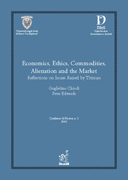Economics, Ethics, Commodities, Alienation, and the Market
Area 14 – Scienze politiche e sociali
Tweet
SINTESI
The aims of this paper centre on the questions that arise for economics, and especially for the dominant market-centred view, by considering the numerous issues – ignored largely by economists – discussed in Richard Titmuss’s The Gift Relationship (TGR). (Section I).Secondly, the significance of Richard Titmuss’s ground-breaking but scantily considered work of 1970 is re-examined in relation to prevailing conceptions of the market and its mechanisms. Occasioned by its recent reprinting, his most well-known work on “human blood” has received partial and belated attention in issue 3 of the European Journal of Political Economy, 2004. Titmuss succeeded in demonstrating not only that the market, as an institution, does not fully accomplish its work of conveying all the relevant information needed to bring about the most efficient outcomes for agents, but more importantly, it actually prevents such outcomes from being realized. Thus, even on the most exclusive of conceptions of economic interest, in certain cases, the market shows itself to be self-defeating. (Section II).Thirdly, the paper relates some of the historical developments whereby moral and ethical considerations have been ousted from economic theorizing since the foundational works of Adam Smith. For, in general, both in content and form, “isolationist” economic models have become increasingly technically sophisticated just as premises or implications of an ethical, social or political character have been either completely ignored or treated as wholly extraneous to these self-sufficient models. Expressions of concern about this state of affairs can be found in the collection of essays edited by Amartya Sen and Bernard Williams entitled Utilitarianism and Beyond [1982] and reprinted [1996], or in Daniel M. Hausman and Michael S. McPherson’s Economic Analysis and Moral Philosophy [1996], especially the Appendix. (Section III).Fourthly, the upshot of Titmuss's contention that important features of an economy work more efficiently when motivations other than individual self-interest are considered, is that the model of an economy needs to take account of the history and values in which it is embedded. In the light of this, some observations about the different circumstances in which altruism and selfinterest are likely to occur are aired. (Section IV).Fifthly, before extending discussion of Titmuss’s analysis to the wage and its ethical ramifications, the paper recalls how the wage is treated in post-classical (or neoclassical) economic theory. According to this theory, labour must be treated just like any other commodity and, as such, must be subjected to the same market rule: it must be evaluated according to the relative “scarcity” of labour. (Section V).Guglielmo Chiodi is Professor of Political Economy at the Faculty of Sociology in “La Sapienza” University of Rome”.Peter Edwards is Professor at University of Kanazawa [J].
| pagine: | 36 |
| formato: | 17 x 24 |
| ISBN: | 978-88-548-0623-8 |
| data pubblicazione: | Giugno 2006 |
| marchio editoriale: | Aracne |
| collana: | Dipartimento Innovazione e Società della “Sapienza” Università di Roma | 5 |

SINTESI













